Organic farming, solar energy, recyclable packaging and other co-friendly practices are propelling Washington’s wine industry into the future
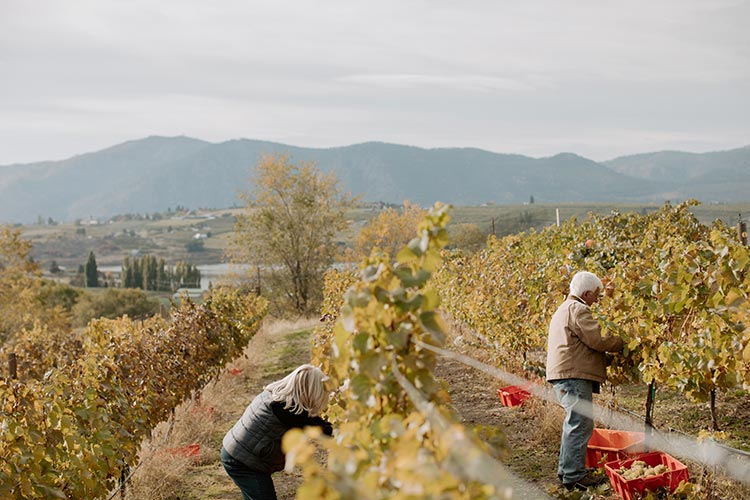
Written by Pam and Gary Baker
TRADITION, not transformation, is often what drives the culture in wine country. The foremost goal is always to make the best wines possible and there is often an economic barrier for small wineries unable to afford to invest in green technology. Yet a growing number of wineries in Washington are taking steps toward reducing their carbon footprint. Organic farming, renewable solar energy, recyclable packaging, and sustainable management of energy, water and soil are among the successes taking root within the industry.
We talked to five wineries on the front line of green and conservation practices that improve bottom line quality in ways everyone can feel good about.
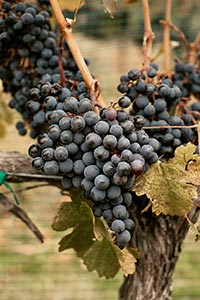
Wines That Reflect The ‘Whole Picture’
We caught up with Don and Judy Phelps, owners of Hard Row to Hoe Vineyards in the Lake Chelan AVA (American Viticultural Area) about their use of earth-friendly techniques for grape growing and wine production. Judy, the winemaker, and Don, the grower, both said they made a conscious decision 15 years ago to go organic, based on their personal beliefs.
The Phelps’ operation was the first LIVE (Low Input Viticulture and Enology) and Salmon-safe certified vineyard and winery in North Central Washington. LIVE means you use the minimum amount of material to protect your fruit and do your job. Don says he uses only organic sprays and fertilizers in the vineyard.
As Don explains, “I made a decision I wasn’t going to spray anything in the vineyard that required me to wear a respirator.”
Judy adds, “We thought as we became the first to become LIVE certified, wouldn’t it be great if other wineries around Lake Chelan followed our lead?” They were the ninth winery to open in the Chelan Valley, and protecting the Chelan Lake watershed was an essential consideration.
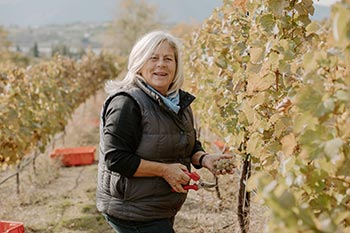
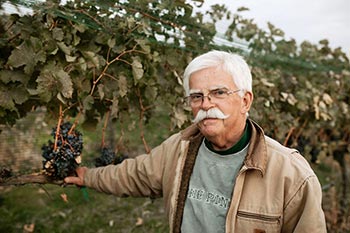
Their long-term commitment to follow standards which use lower amounts of approved material is paying off in the vineyard by producing healthier fruit and increasing flavors of the wines. Plus, their organic farming practices are more appealing to customers.
Like true pioneers, they educated themselves following a “trial and error” process of implementing more natural vineyard maintenance practices, including utilizing native-insects like the praying mantis, alternate mowing between rows, and hand pruning the trellis system in the vineyards.
They have recently introduced a new label: “Whole Picture” wines that reflect both the vineyard and winemaking practices represented by the individual tiles pictured on the label showing the processes that went on in the vineyard and winery.
Their first release was a single vineyard, single-varietal sparkling Cabernet Franc 2019 Pét-Nat méthode ancestrale that scored 93 points by Washington Tasting Room Magazine. “It’s a direct expression of the vineyard,” Judy says. Their second release under this label was an amphora aged Cabernet Franc that is much along the line of a Beaujolais wine with no oak influence and released just 9 months after harvest. Bright, fresh and fruity, it is quickly developing a following.
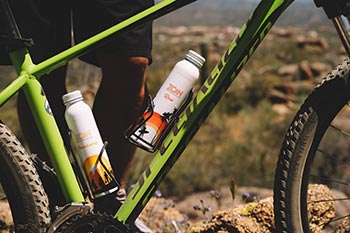
Lightweight, Recyclable & Resusable
If you haven’t heard about the success of canned wines and recyclable reusable packaging, then you haven’t had the delightful opportunity to talk with Rob and Brenda Mercer, owners of Mercer Estates Winery headquartered in Prosser.
Known for their conservation efforts and responsible stewardship of the land, the Mercers use lightweight, recyclable, reusable aluminum cans to package their ICAN wines and ICAN hard seltzers. Think Chardonnay, Rosé, and a line of fruit-flavored wine spritzers in half bottle sizes with a resealable cap. As Rob points out, “You not only have a totally recyclable product, it can be reused as a water bottle.”
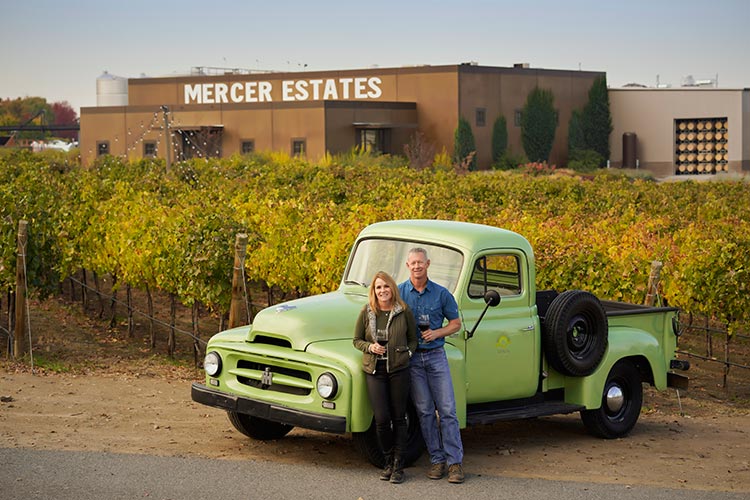
With half the weight at half the volume, wine shipments cost less. Using smaller, lighter-weight cardboard boxes without the need for plastic separators provides a better, safer way to protect both the environment (less trash) and the product (no glass).
Although the Mercers still use bottles for their other wine tiers, the canned wines are proving ever more popular and have enabled the winery to expand its marketing to “grab and go” convenience stores.
Brenda says the “ICAN” concept was a bootstrap project from the start, something unique to the winery. Her energy behind it conjures up that iconic image of World War II’s Rosie the Riveter and the accompanying expression, “We can do it!”
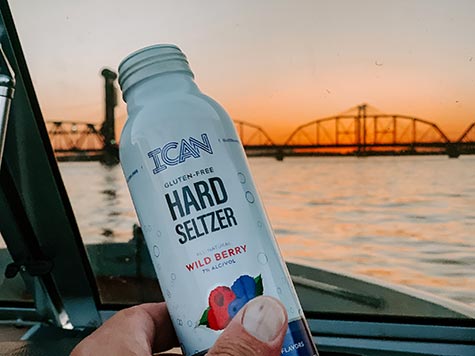
Rob says they learned how to get started by working with can suppliers. While the canned Rosé and Chardonnay have been on the market for a while, the ICAN hard seltzers were only launched a few months ago. According to the Mercers, the science behind the ICAN concept raises the quality of the wines and seltzers in both body and mouthfeel.
Rob says, “Doing things that are environmentally friendly and sustainable are always foremost in our minds.” Using high quality estate-grown fruit from their sustainably farmed vineyards, the Mercers are confident their use of recyclable, reusable cans will continue to grow in the future.
Taking A Holistic Approach To Winemaking
Despite the name “Walls” being a play on the locals’ nickname for the nearby penitentiary, there is no confining The Walls Vineyards in Walla Walla to a limit on solar technology and renewable energy. General manager Carrie Alexander says, “Sustainability is the winery’s mission,” adding that she and owner Mike Martin think about the topic every day. Indeed, utilizing every possible planet-friendly technique in modernizing the winery’s facility seems to be their goal.
The winery underwent a lengthy systematic process to become a B-Corp certified business, which verifies a company’s reduced environmental impact utilizing eco-friendly business practices. “We’re constantly thinking about our use of plastic, the use of energy, our packaging, and recycling to minimize our impact on the earth,” says Alexander.
With recently installed solar panels on the roof, The Walls winery practically glows from renewable energy saving. The winery’s $200,000 investment in solar technology has saved roughly 100 tons of CO2 emissions, the equivalent of planting 5,000 trees. Along with the excess power generated by the solar panels, Alexander says, “The winery also makes a monthly donation to support renewable energy with Pacific Power’s Blue Sky program.”
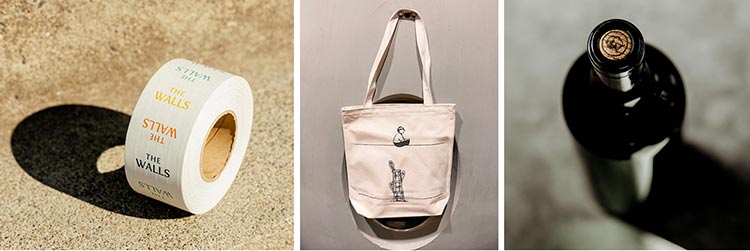
The vineyard is farmed organically, and the wine is made with a minimum of intervention. “The Walls strives to take a holistic approach to everything, including relying on an increased usage of neutral oak barrels for aging,” says Alexander.
Other measures include switching to lighter-weight glass bottles, composite natural cork called Diam that utilizes the earth-friendly processes (and virtually eliminates cork-taint), and 100% organic cotton bags made in the USA for wine carriers. They’ve reduced the use of foil capsules, and use shipping packaging made from recycled cardboard pulp, even using paper tape to seal the boxes so that no plastic is used in the shipping of their wine.
Because glass recycling is not available in Walla Walla, the winery is installing a glass crusher for recycling used wine bottles. The ground glass can be used in landscaping or refired in large rock kilns for fabricating glass art objects. The Walls is also installing an onsite electric car charging station that runs off of solar power for customers who drive electric vehicles.
These cleaner practices not only generate cost savings for The Walls, they generate respect from happier customers who appreciate the winery’s concern for protecting the environment.
Compostable Wine Shipping Packages
Certified 100% sustainable in 2009, Amavi Cellars continually seeks nature-friendly alternatives. For example, composting and no harsh chemicals are used in the estate vineyard. But its philosophy goes beyond responsible farming according to co-owner and winemaker Jean-François Pellet.
The winery has one of the largest solar energy installations in Washington, no longer uses capsules on its wine bottles, changed all its lighting to LED, and uses compostable wine shipping packages made from recyclable materials. It hasn’t used Styrofoam in its packaging in years.
Pellet grew up in Switzerland where he says, “You can recycle your whole house. We never put glass or a battery in the garbage. It’s something I’ve been born and raised with.” Using eco-friendly practices in his grape growing, wine production and distribution just comes naturally.
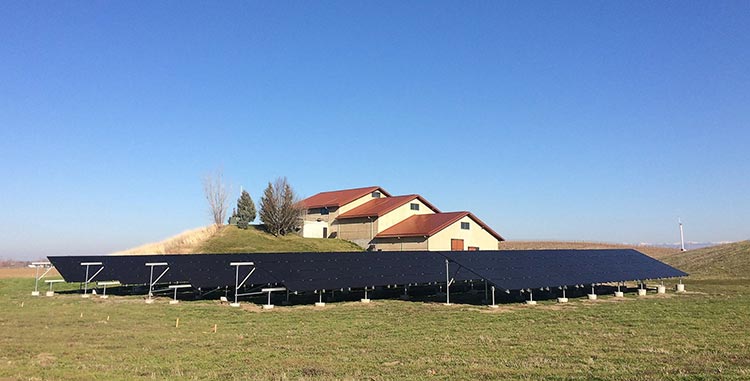
To find an alternative to using Styrofoam packaging, Pellet talked to vendors at trade shows both in Europe and the US. It was at the Unified Wine and Grape Symposium where he discovered a packaging company, Fleetwood-Fibre Packaging, that produces natural-colored, not dyed, cardboard cases that wrap and protect the wine during shipping. Pellet says, “It’s not a cheap package, but it’s strong and safe.” Amavi hasn’t experienced any problems with breakage. The cases come in four different sizes to accommodate small or large shipments of wine with one type of insert that fits all.
In the near future Pellet says they are looking at ways to use less and less water. “Keep trying to push the envelope,” he says. “Although you can’t change the world in a minute, you do it because it’s the right thing to do for the earth and future generations.”
Biodynamic Grape Growing
Hedges Family Estate has embraced biodynamic farming since 2009. Currently, they operate three vineyards in the Red Mountain AVA that are certified Biodynamic by the Demeter Association, and two more vineyards that are farmed organically.
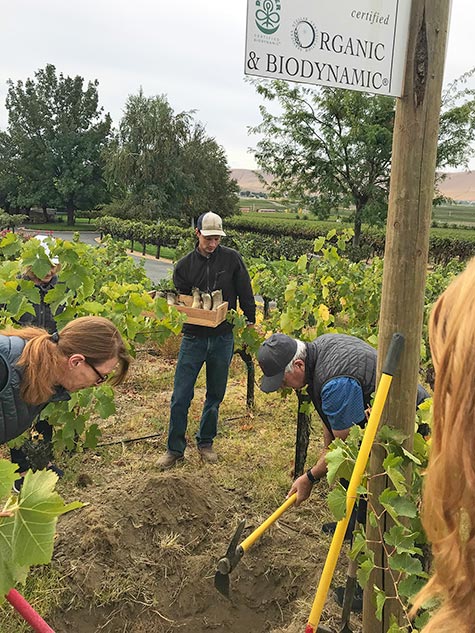
Both organic and biodynamic farms grow their food without the use of pesticides, herbicides, or GMOs (genetically modified organisms). Both practices are good for the environment, relying on natural remedies to combat insects and disease. But biodynamic farming, developed by an Austrian scientist and philosopher named Rudolph Steiner in 1924, takes it further. It regulates farming practices through the lunar calendar. Planting, pruning, and harvesting is done by hand. And in wine production, no commercial yeast is added to the wine during fermentation. Other practices include planting various cover crops in the vineyards to crowd out the tumbleweeds, but per Biodynamic standards must leave a minimum of 10% of vegetation in indigenous plants. They also spread the pomace (seeds, skins and stems) throughout the vineyards for dust control.
Tom Hedges and his wife, Anne-Marie, lived in several different countries before settling in Washington and starting Hedges Cellars in 1986. Their son, Christophe, now handles the marketing and their daughter, Sarah Hedges Goedhart, is the winemaker.
Back in 2009, Christophe approached his father with an idea about going organic. Tom Hedges admits he was a bit skeptical but open to the idea. He hired consultant Phillipe Armenier from Santa Rosa, CA who advised him not to convert all of the vineyards to biodynamic at once. He recommended that Tom start slowly and see how he liked it.
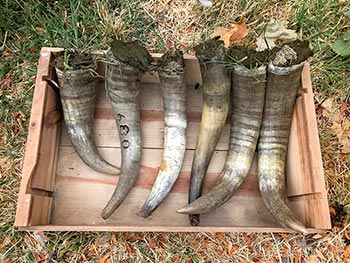
In 2009 they started biodynamically farming in their main estate Hedges Vineyards and Christophe’s four acres of Cabernet Sauvignon. By 2011 both vineyards were certified. Then in 2017 they converted their Syrah vineyard to biodynamic and started organically farming the remaining two vineyards. Tom Hedges says they will both be certified by their next harvest in 2021.
The vineyards employ 40 free roaming chickens that love to eat pests, such as cutworms. They use cow manure as a natural fertilizer and harvest by the phases of the moon. The winery’s onsite chefs use produce grown in the biodynamic garden and eggs from the chickens in the kitchen. When they have excess eggs and produce, they donate it to a local food bank.
The winery currently makes two fully biodynamic wines and others that are organic. Sarah hopes to add sheep and goats to the mix so that one day Hedges Family Estate might be a fully self-contained farm.
